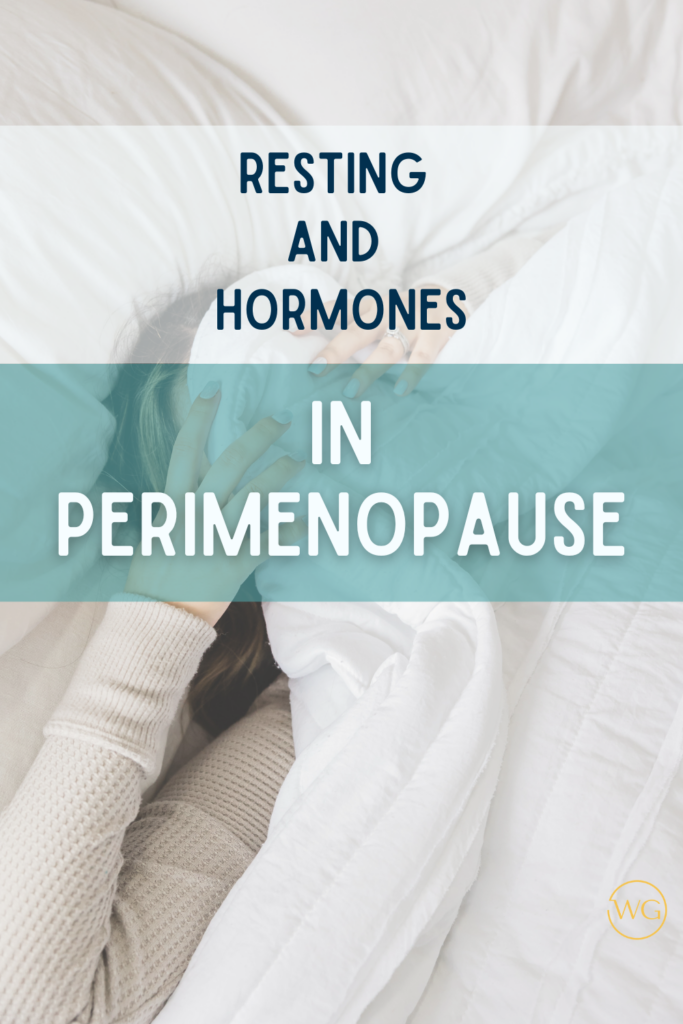Perimenopause, the transitional phase before menopause, involves significant hormonal changes that can affect your health, including sleep patterns. Understanding the role of perimenopause hormones is essential for managing your symptoms and promoting overall wellbeing.
Hormonal changes during perimenopause
Perimenopause hormones: Estrogen levels fluctuation
During perimenopause, estrogen levels fluctuate unpredictably as the ovaries gradually decrease hormone production. A fluctuation in hormones can cause irregular menstrual cycles, causing symptoms like hot flashes, mood swings, and sleep changes. Estrogen plays a crucial role in regulating the sleep-wake cycle. Disruptions in its levels can affect the quality and duration of sleep.
Decrease in progesterone levels
Progesterone, another important hormone, also changes during perimenopause. While estrogen levels rise, progesterone levels gradually decrease. Progesterone promotes calmness and gets the body ready for sleep. You may experience trouble falling or staying asleep when your progesterone levels decrease, which adds to sleep disturbances during perimenopause.

The impact of perimenopause hormones on rest
How estrogen rises influence sleep patterns
If you can’t stay asleep, you should know that it’s due to estrogen. Changes in estrogen levels can disrupt the body’s natural clock, making it difficult to fall and stay asleep. Estrogen promotes deep, rejuvenating sleep and helps regulate the sleep-wake cycle. Changes in estrogen levels during perimenopause can cause insomnia, frequent nighttime awakenings, or a lethargic feeling when you wake up. During perimenopause, sleep disruptions can have a significant impact on your overall health and quality of life.
The role of progesterone in sleep disturbances
Dealing with insomnia, or feeling restless? Progesterone is to blame.
Progesterone promotes calmness and gets the body ready for sleep. On the other hand, low perimenopausal progesterone levels can result in restless and insomniac nights. You may have trouble falling or staying asleep through the night, which has an impact on the quality of your sleep overall and your ability to function during the day.
Perimenopause hormones: Testosterone and DHEA
While the main hormones impacted during perimenopause are progesterone and estrogen, DHEA (dehydroepiandrosterone) and testosterone may also have an impact on sleep patterns. Only some women have testosterone, which is frequently linked to male hormones and supports general wellbeing, including energy levels and muscle mass.
Testosterone levels may drop during perimenopause, affecting vitality and energy levels, which may have a knock-on effect on sleep quality. Similarly, sleep patterns and general quality of sleep may be impacted by DHEA, a precursor hormone that decreases with age.
Strategies for improving rest during perimenopause
Establishing a sleep routine
During perimenopause, keeping a regular sleep schedule can help you regulate your body’s internal clock and improve the quality of your sleep. You should keep bedtime and wake time regular so your body’s natural sleep-wake cycle is synchronised. This makes it easier to go to sleep and wake up feeling fresh. In order to prepare the body for sleep, engaging in soothing bedtime rituals such as reading a book, having a warm bath, or practicing mindfulness meditation can help.
Creating a sleep-nurturing environment
Creating a sleep-friendly environment can significantly impact sleep quality during perimenopause. Keep your bedroom cool, dark, and quiet, with comfortable bedding and few distractions. Consider purchasing a supportive mattress and pillows that will adequately support your body. Using blackout curtains, white noise machines, or earplugs can help you cut down on outside light and noise. That promotes deeper, more restful sleep.
Incorporating relaxation techniques
Incorporating relaxation techniques into your bedtime routine can help calm the mind and body, making it easier for you to fall asleep and stay asleep. Before going to bed, you can de-stress and ease your anxiety with the help of progressive muscle relaxation, deep breathing exercises, and guided visualisation. Performing these rituals helps you to become more resilient and calm, enabling you to accept the rise and fall of perimenopause hormones with grace.
The right kind of nutrition for better rest
Your sleep patterns can frequently be disrupted by perimenopause hormones, but the effects can be reduced by making wise dietary decisions.
You have probably noticed that your sleep quality suffers after a heavy meal or coffee in the evening. Caffeine, alcohol, and heavy meals affect sleep cycles and make it harder for your body to fall asleep. Instead, eat lighter, more easily digestible meals in the evening and avoid coffee and alcohol several hours before bedtime.
To improve sleep quality and relaxation, include foods like cherries, almonds, fatty fish (such as salmon), and herbal teas (such as chamomile or valerian root) in your evening routine. These foods have nutrients and other ingredients that can help control your sleep-wake cycles and boost the release of hormones that put you to sleep.
Taking care of your gut with the essential nutrients it needs to thrive is key. So, high-quality gut health supplements are what I’d recommend. Because so many people have gut health issues which means we absorb fewer nutrients from our food. Gut issues arise from stress, poor diet and hormone imbalances (hello perimenopause!). This is why we have to support our gut health to ensure we’re getting the benefits and nutritients from the food we’re eating.
Conclusion
Remember to be kind with yourself as you go through this transitional period. With patience and resilience, perimenopause can be a time of growth, empowerment, and renewed vitality. Click here to get my complimentary perimenopause resource guide so you can start with confidence and resilience.